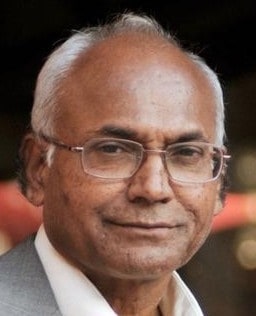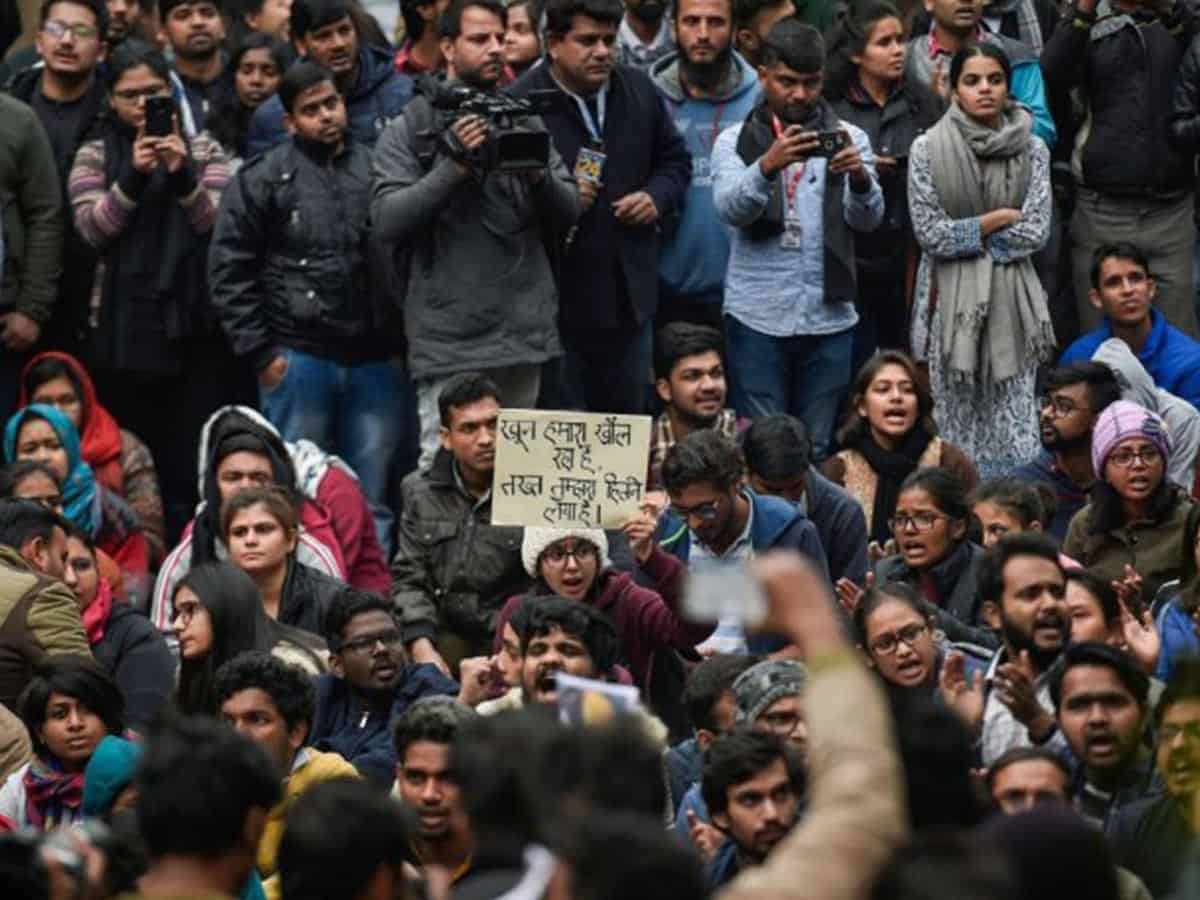
Kancha Ilaiah Shepherd
The attack by masked forces, who were freely allowed to enter the JNU campus and injured teachers and students tell a new story of the BJP rule in Delhi. It is likely that they want to dismantle JNU and some other universities in the country. Rastriya Swayamsevak Sangh (RSS) and Bharatiya Janata Party (BJP) have major issues with universities that teach social science courses seriously.
In this attack about 35 people including the Students’ union president Aishe Ghosh and some teachers were injured. The way dozens of masked people entered the JNU campus tells a new story of anti-academic muscle power in operation in universities that are meant to produce new knowledge and change the life people of India.
Universities were never major structures of education in the world before political democracy as a system emerged. People’s rights, elections, modern markets, new cultural platforms came into human life because of universities. They synthesized knowledge resources of diverse people, living in different areas in the world. Serious university education in India is very modern and relatively recent. It has not yet mobilized new knowledge resources that are available in all fields of life of Adivasis, Dalits, Other Backward Classes and upper Shudra agrarian forces. So far the research is West or mythology centered. This is likely to change with the children of productive castes moving into universities like JNU.
Though we talk about Nalanda University as most ancient university of India, it was never a major university like the present universities with a view of secular mobilization of ideas and teaching of them to young educated persons, in all fields of human life. The first modern university with a modern educational purpose was established in India only in 1857 in Madras. That means we only have a history of 163 years of university education in India. But the university structures till today remained Brahminic, without producing serious indigenous knowledge. That is slowly changing.
As of now India has 993 universities (as of 2019) and among them the JNU is the best. The Rastriya Swayamsevak Sangh and the Bharatiya Janata Party leaders know this very well.
Its social science reputation is well known. Established in the early 1970s it has produced outstanding social science scholars, leaders and bureaucrats. RSS and BJP seems to think that because of its quality of education–more so in social sciences– it is dangerous. They, therefore, characterize it as communist.
Every serious social science student in the country wants to seek admission in JNU and it is this strong social science base of that university that worries RSS-BJP Brahminism. I was one such admission seekers without success.
In 1976, when I was in the final year of MA at Osmania University, Hyderabad, JNU was the most coveted university for the serious M Phil and Ph D aspirants. To fulfill that dream, I took a loan and went to Delhi for the first time. I had to spend more effort to go there than the upper-caste rich do to go to Oxford or Harvard. However, I could not make it. I thought I missed a lot in life as I did not get admission in JNU. Even today no other university matches it in giving exposure, serious reading, debates and interaction with global scholarship as JNU does.
RSS-BJP view is that it is a Communist university without any regard for religion, particularly Hindu textual knowledge. Hence its social science culture is dangerous to their future. This is how even many Muslim leaders in the Middle East think about university education. Hence they too did not develop serious university structures that mobilize knowledge of social systems beyond religion. Many Muslim leaders in the Middle East also think that social science studies are Communist in nature.
What RSS-BJP leaders do not understand is the notion of nation, the notion of better organization of human beings to have better life than what they were having before, came from the university education. Serious religious and secular studies in a manner to upgrade human living standards evolved in universities.
They think that mechanical, technical and medical education is enough, as those who are educated in those fields follow the religious practices without applying those scientific tools to human organization. Universities constantly change those organization structures because of social science studies. Without a serious social science study and education any nation’s political institutions, media structures and even medical and engineering institutions would not have developed.
Great European thinkers developed new ideas with a great struggle in social science studies. They interpreted religious texts, production systems, the stories and life of human personalities that come to us in the religious texts in a very radically different way, with a positive approach. Methodologically that approach was called positivism. For example, a major thinker of early 19th century G.W.F. Hegel wrote a book on Jesus called the The Life of Jesus in which he drew a different conclusion from his teaching which no other theologian could draw.
According to Hegel the idea of Reason from moving away from blind Faith was mooted by Jesus Christ. It was Jesus who also constructed the idea of spiritual citizenship in Kingdom of God. Hegel’s foundational theory of Spirit, which is different from body and the moving force of humanity, was taken from Jesus’ teaching.
Hegel drew a great theoretical lesson from one of the statements of Jesus that says “Man as man is not altogether sensuous being, he is not by nature just confined to pleasure seeking impulses. He has a Spirit too; as rational being he received as his inheritance as a spark of divine essence.” It is from these ideas of Jesus that Hegel worked out his theory of Reason, Spirit and Dialectics.
It is true that the Indian universities have not yet produced serious scholars who could re-interpret the Indian mythological or theological texts. Only Dr. B. R. Ambedkar did that and he came to a conclusion that RSS-BJP leaders and scholars do not agree with. His assessment of Manu and writing was against their understanding. No communist Brahmin scholar came to such a conclusion about the Brahminc parampara of ancient India. Many scholars like Ambedkar are likely to emerge from the social science departments of universities. This is a worrisome situation for them.
From the very same texts, unlike Ambedkar, Mahatma Gandhi and V. D. Savarkar came to a different conclusions. But both of them were not social scientists like Ambedkar. However, Gandhi drew a non-violent lesson from his own study and Savarkar drew very violent lesson and they seriously differed while both of them were studying their law in London–not political science, economic or sociology.
One of the serious fears of the RSS-BJP is that not many wealthy and upper caste youth are going into social science studies to protect their ideologies, these days. The social science studies have now become the bastion of Shudra, OBC, Dalit and Adivasi youth. They seem to think that all those who study social science courses seriously, even though study Hindu texts, might come to same conclusion that Ambedkar came to. Hence nullification of social science higher education, particularly in serious universities like JNU has become their priority.
But that assumption itself is based on wrong notion of social sciences. Muslim religious leaders also have similar understanding of social science studies. They also think that Reason based derivative study of the Quran might lead to problems.
But what they do not understand is that when the religious texts are seriously studied with a sociological perspective lot of new interpretations would emerge and that would increase the ‘Social Reasoning.’ It is this social reasoning that causes advancement of science and technological knowledge. Such serious social science studies did not lead to abolition of Christianity in the West where very serious scrutiny of Bible and Christian history took place.
The recent organized attack on JNU teachers and students seems to have been done with a design to set the clock of university education back in India. There is a strong view among RSS-BJP leaders that mass votes do not depend on university struggles. But once universities collapse democracy, economy and the whole Indian modern social system will collapse. We will go back to medieval times and get dictatorship as it is in many Middle Eastern countries.
The article was first published in Counter Current.Org and Daily Hunt. Kancha Ilaiah Shepherd is political theorist, social activist and author

